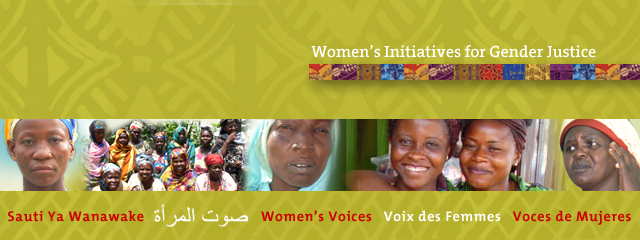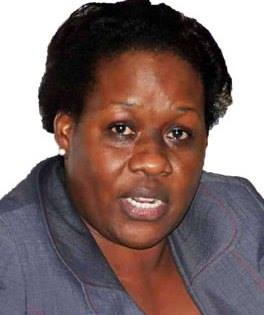|
|
||
|
||
 |
||
June 2015 |
||||
Welcome to the |
||||
|
||||

The Women's Initiatives for Gender Justice is an international women's human rights organisation that advocates for gender justice through the International Criminal Court (ICC) and through domestic mechanisms, including peace negotiations and justice processes. We work with women most affected by the conflict situations under investigation by the ICC. The Women's Initiatives for Gender Justice works in Uganda, the Democratic Republic of the Congo, Sudan, the Central African Republic, Kenya, Libya and Kyrgyzstan. Offices 
|
Dear Friends,Welcome to a Special Issue of Women’s Voices, a regular eLetter from the Women’s Initiatives for Gender Justice. In Women’s Voices, we provide updates and analysis on political developments, the pursuit of justice and accountability, the participation of women in peace talks and reconciliation efforts from the perspective of women’s rights activists within armed conflict situations, specifically those countries under investigation by the International Criminal Court (ICC) including Uganda, the Democratic Republic of the Congo (DRC), Darfur, the Central African Republic (CAR), Kenya, Libya, Côte d’Ivoire and Mali. In addition to Women’s Voices, we also produce a regular legal eLetter, Legal Eye on the ICC, with summaries and gender analysis of judicial decisions and other legal developments at the International Criminal Court (ICC), and discussion of legal issues arising from victims’ participation before the Court, particularly as these issues relate to the prosecution of gender-based crimes in each of the Situations under investigation by the ICC. More information about the work of the Women’s Initiatives for Gender Justice and previous issues of Women’s Voices and Legal Eye on the ICC can be found on our website 4genderjustice.org. This June 2015 Special Issue of Women’s Voices features the Women’s Initiatives for Gender Justice’s tribute to Joan Kagezi, Senior Principal State Attorney in Uganda. The tribute was written by Brigid Inder, Executive Director of the Women’s Initiatives for Gender Justice and was first published on 25 April 2015 by openDemocracy. We have re-printed the tribute here in order to share it with our friends, colleagues and allies. A tribute to Joan Kagezi: the murder of a human rights defenderby Brigid Inder, Executive Director, Women’s Initiatives for Gender Justice Republished blog post
Just a few days before her death, Joan had shared with a colleague that she had not liked the way one of the accused in the case was staring at her during a recent court session. She said she felt that he was looking at her in a menacing way and it made her feel uncomfortable. Earlier in the case she had asked the presiding judge to not allow the accused to sit in the public gallery but rather to have them seated together within the Court room. The Judge had refused her request stating that it would injure the health of the accused to do so. Joan Kagezi was a long-time friend of the Women’s Initiatives for Gender Justice. She was softly-spoken with a calm, unflappable demeanour which belied her steely and unswerving determination and her sharp prosecutorial mind. Working with Joan generated hope that post-conflict Uganda was on the right track and that its judicial system, although struggling, might rise to the challenge. Maybe our work together helped all of us believe that despite the longevity of the conflict and the pain, torment and suffering of multiple generations of northern Ugandans, justice, truth and reconciliation, or something akin to these aspirations, may yet be possible. We met Joan in the course of our legal monitoring and advocacy work regarding prosecutions associated with the LRA-related conflict before the International Crimes Division (ICD) of the High Court of Uganda. As head of the DPP’s war crimes and anti-terrorism division, Joan was the lead Prosecutor in the latter stages of the ICD case against Thomas Kwoyelo, a former commander of the Lord’s Resistance Army (LRA) who was charged with the war crimes of murder, attempted murder, kidnapping and destruction of property, amongst other acts. Notably, there were no charges for gender-based crimes in this case despite Kwoyelo’s rank within the LRA and the multiple sources describing the militia’s practice of assigning abducted girls and young women to commanders for sexual and domestic purposes. It is also noteworthy that no charges were brought under the Ugandan ICC Act although some of the incidents for which Kwoyelo is charged are also incidents which have been the subject of ICC investigations. We worked very closely with Joan on these issues. She was receptive to our advocacy and supportive of the inclusion of sexual and gender-based crimes in the ongoing investigative and prosecutorial priorities of the ICD. She informed us last year that she was hopeful that the next round of LRA-related cases would likely include charges for these crimes. The larger challenge in the Kwoyelo case was his application to the Ugandan Amnesty Commission and potential eligibility to be pardoned under the Amnesty Act. More than 24,000 certificates of amnesty have been granted to ex-combatants under this act, and prior to the Kwoyelo case, no one who had applied for amnesty had been denied. The Women’s Initiatives and our partners, especially the Greater North Women’s Voices for Peace Network (GNWVPN), have been persistently vocal in critiquing the failure of the Act to include amnesty conditions regarding requirements for: truth telling; a confession - individuals are not required to make a full declaration of the acts they had committed or the incidents they may have witnessed; the exclusion of certain crimes including sexual and gender-based violence from qualifying under the amnesty regime; and an apology to direct victims of their crimes and those in the broader community affected by their actions. In practice, the Amnesty Act has provided a blanket immunity from prosecution for sexual violence and other crimes, for the entire period of the Ugandan LRA conflict. Many in the community are critical of the Amnesty Commission which appears to them to provide support to former perpetrators, while no support is provided by the Government and district councils to victims/survivors. In addition, according to the GNWVPN, even amongst those granted amnesty the treatment is unequal with former LRA commanders treated considerably better than those abducted, especially the female abductees. This was an issue we discussed at length with Joan who was sympathetic to the situation of victims/survivors. She shared our concerns that the Amnesty Act was impeding prosecutions and hindering the accountability demanded by victims/survivors, desperately needed by communities as part of the reconciliation process and guaranteed under the Juba Peace Agreements. Joan’s chance to address this came when the Ugandan Constitutional Court ruled in 2011 that Kwoyelo was eligible for amnesty and ordered the legal proceedings against him to cease and his immediate release from detention. In response, the Attorney General appealed this decision to the Supreme Court and in the subsequent hearing the DPP, with Joan as lead Prosecutor, challenged the decision by the Constitutional Court. The DPP argued that the Amnesty Act did not prevent it from prosecuting crimes within its jurisdiction, that Kwoyelo did not qualify for amnesty because he was captured and had not surrendered, and that the DPP had not discriminated against Kwoyelo by prosecuting him even though other commanders, including those more senior, had been granted amnesty in the past. Those of us working on this issue had been waiting for the Supreme Court judgment since 2012. Finally, on 8 April 2015, a week after Joan’s murder, the Supreme Court issued its ruling finding that the Act does not impinge upon the prosecutorial powers of the DPP and that the DPP had not discriminated against Kwoleyo because it is within its purview to consider each amnesty application in its own right. This clears the way for the case against Kwoyelo, the first in relation to the 25 year LRA-related conflict, to resume. Perhaps most importantly, the Court provided much needed guidance and clarity regarding the crimes for which amnesty cannot apply. While not applicable in the Kwoyelo case, the judgement implicitly recognises acts of sexual violence as war crimes and grave breaches under Article 147 of the Fourth Geneva Convention as crimes for which an individual would not be eligible for amnesty. This is a ground-breaking judgment within the Ugandan context. Although no longer alive at the time of the decision, this ruling and its important clarifications is one of Joan’s most important legal legacies. ■ Read the Women’s Initiatives for Gender Justice statement on the murder of Ugandan Prosecutor Joan Kagezi
|
|
|
||||||||||||||||||||||||||
 On 30 March, at around 7.30pm, Joan Kagezi, Senior Principal State Attorney in Uganda, was murdered by unidentified assailants, who opened fire on her while she was driving home from work.
On 30 March, at around 7.30pm, Joan Kagezi, Senior Principal State Attorney in Uganda, was murdered by unidentified assailants, who opened fire on her while she was driving home from work. 